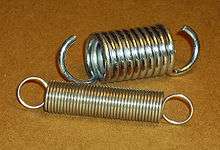Definify.com
Webster 1913 Edition
Coil
Coil
(koil)
, Verb.
T.
[
imp. & p. p.
Coiled
(koild); p. pr. & vb. n.
Coiling
.] 1.
To wind cylindrically or spirally;
as, to
. coil
a rope when not in use; the snake coiled itself before springing2.
To encircle and hold with, or as with, coils.
[Obs. or R.]
T. Edwards.
Coil
,Verb.
I.
To wind itself cylindrically or spirally; to form a coil; to wind; – often with about or around.
You can see his flery serpents . . .
Coiting
, playing in the water. Longfellow.
Coil
,Noun.
1.
A ring, series of rings, or spiral, into which a rope, or other like thing, is wound.
The wild grapevines that twisted their
coils
from trec to tree. W. Irving.
2.
Fig.: Entanglement; toil; mesh; perplexity.
3.
A series of connected pipes in rows or layers, as in a steam heating apparatus.
Induction coil
. (Elec.)
See under
– Induction
. Ruhmkorff’s coil
(Elec.)
, an induction coil, sometimes so called from
Ruhmkorff
, a prominent manufacturer of the apparatus.Coil
,Noun.
[Of Celtic origin; cf. Gael.
goil
fume, rage.] A noise, tumult, bustle, or confusion.
[Obs.]
Shak.
Webster 1828 Edition
Coil
COIL
,Verb.
T.
COIL
,Noun.
1.
A rope gathered into a ring; on shipboard, a single turn or winding is called a fake, and a range of fakes is called a tier.2.
A noise, tumult, bustle.Definition 2026
coil
coil
English
Noun
coil (plural coils)
- Something wound in the form of a helix or spiral.
- the sinuous coils of a snake
- Washington Irving
- The wild grapevines that twisted their coils from tree to tree.
- Any intrauterine device (Abbreviation: IUD)—the first IUDs were coil-shaped.
- (electrical) A coil of electrically conductive wire through which electricity can flow.
- (figuratively) Entanglement; perplexity.
Synonyms
- (coil of conductive wire): inductor
Derived terms
Terms derived from coil
|
Translations
something wound
|
|
intra-uterine contraceptive device
electrical
|
|
Verb
coil (third-person singular simple present coils, present participle coiling, simple past and past participle coiled)
- To wind or reel e.g. a wire or rope into regular rings, often around a centerpiece.
- A simple transformer can be made by coiling two pieces of insulated copper wire around an iron heart.
- To wind into loops (roughly) around a common center.
- The sailor coiled the free end of the hawser on the pier.
- To wind cylindrically or spirally.
- to coil a rope when not in use
- The snake coiled itself before springing.
- (obsolete, rare) To encircle and hold with, or as if with, coils.
- (Can we find and add a quotation of T. Edwards to this entry?)
Translations
wind into regular rings
|
wind into loops
Etymology 2
Origin unknown.
Noun
coil (plural coils)
- (now obsolete except in phrases) A noise, tumult, bustle, or turmoil.
- 1594, William Shakespeare, Titus Andronicus, Act III:
- If the windes rage, doth not the Sea wax mad, / Threatning the welkin with his big-swolne face? / And wilt thou haue a reason for this coile?
- 1624, John Smith, Generall Historie, in Kupperman 1988, p. 162:
- this great Savage desired also to see him. A great coyle there was to set him forward.
- 1704, Jonathan Swift, A Tale of a Tub:
- they continued so extremely fond of gold, that if Peter sent them abroad, though it were only upon a compliment, they would roar, and spit, and belch, and piss, and f—t, and snivel out fire, and keep a perpetual coil, till you flung them a bit of gold [...].
- 1594, William Shakespeare, Titus Andronicus, Act III:
Quotations
- For usage examples of this term, see Citations:coil.
Derived terms
Translations
noise
Anagrams
Irish
Pronunciation
- IPA(key): [kɛlʲ]
Noun
coil m
- vocative singular of col (“prohibition; sin, lust; violation; dislike; incest; relation, relationship”)
- genitive singular of col (“prohibition; sin, lust; violation; dislike; incest; relation, relationship”)
Mutation
| Irish mutation | ||
|---|---|---|
| Radical | Lenition | Eclipsis |
| coil | choil | gcoil |
| Note: Some of these forms may be hypothetical. Not every possible mutated form of every word actually occurs. | ||
